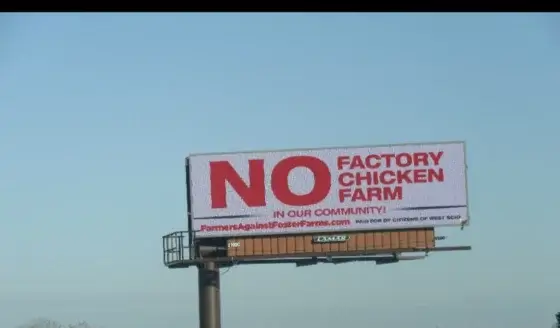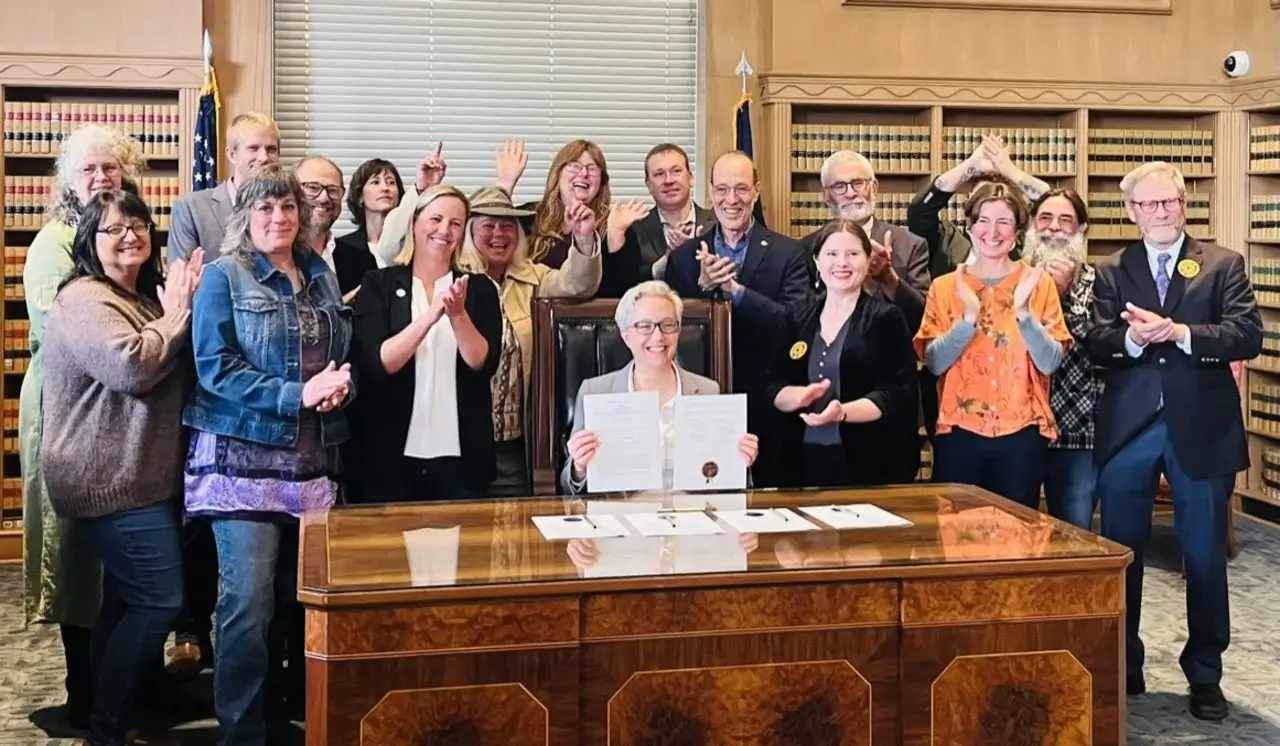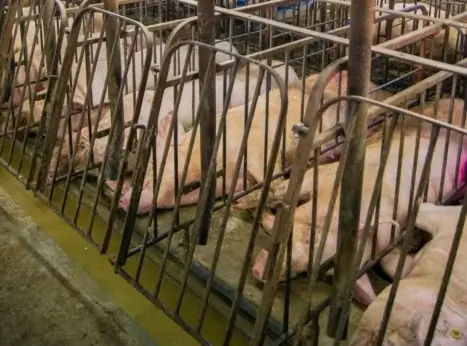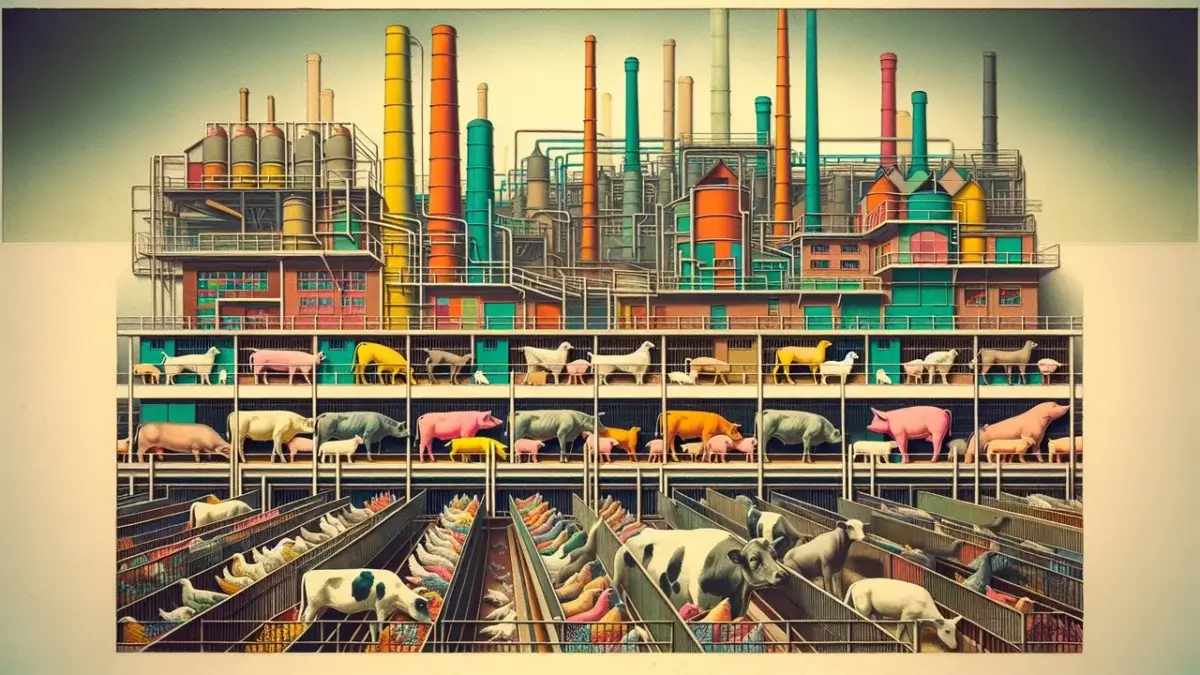Advice From Those Organizing Against Factory Farms
When large animal livestock operations are coming to town, here’s some advice from people who have experienced it firsthand.
When Mary Dougherty first heard of the plan to build a 26,000-hog concentrated animal feeding operation (CAFO) in her home of Bayfield, Wisconsin, she knew it was bad news. What she didn’t know was what to do about it.
She had never thought of herself as an organizer or an environmentalist. She ran a restaurant. She published a cookbook. She was a mom to five kids. Of all the hats she wore, organizer wasn’t one of them.
“I had no idea about any of this stuff,” says Dougherty. “Literally zero—less than zero probably. I didn’t know what the hell I was doing.”
Dougherty is definitely not unique in this respect. It is very hard for most people to know what to do to organize against the threats presented by factory farming in their community. While reporting our story about some of the communities that have resisted or are currently resisting factory farms, including Dougherty’s, we came across a lot of great advice from people who themselves have been in this position. Whether you’re organizing in response to a particular factory farm site or advocating for systemic change, learning from the experiences of others can be a great place to start, so we’ve compiled some of those insights for you here.
Align yourself with a supporting organization
Food & Water Watch addresses factory farming on a big-picture scale. Michaelyn Mankel of Food & Water Watch Iowa says connecting with others is valuable at that broader scope, too.
“If you’re really serious about getting involved in this work, the most important thing I think there is to do is to find your people.”
Jennifer Breon of Food & Water Watch Iowa echoes this point.
“I think collective action is key, whether it’s Food & Water Watch or any other environmental organization that’s working on factory farm issues, or environmental issues around agriculture, where you can have a sphere of influence. Don’t just do this on your own.”
When Barb Kalbach became aware of a hog CAFO being planned for just up the road from her in 2002, she called on the help of Iowa Citizens for Community Improvement. After successfully resisting the CAFO, she now works with Iowa CCI. According to Kalbach, aligning yourself with an organization can help you with strategy you might miss on your own. “It’s just those little things…that you and I wouldn’t think of, and that an organization that’s worked and helps people like that, they do think of that.”
Resources
Food & Water Watch has chapters across the US and organizes at a national level as well.
Iowa CCI provides assistance on a variety of social and environmental issues in Iowa.
Socially Responsible Agriculture Project (SRAP) has a Help Hotline for communities struggling against factory farming.
Environmental organizations can also be good to reach out to, especially ones that participate in water monitoring such as the Waterkeeper Alliance.
Communication is key
Dougherty, now senior regional representative with SRAP, recommends creating opportunities for community members to talk and be heard. Listening is key early on:
“Just literally holding space for folks and listening to them talk through the incredulousness of what they’re confronting…Tell me what’s going on, how is this impacting you? Are other people concerned? For me, at least the first couple of meetings are not spent devising a plan of attack; the first couple are completely based in, ‘Tell me more,’ as opposed to, ‘Let me tell you something.’”
Communication isn’t just important at the beginning. Emily Tucker of Food & Water Watch New Mexico recommends talking to others about what you’ve observed.
“Talk to your neighbors about it. Alone, we can’t get much done. But I think that the more folks work together and just say, Hey, I’ve noticed this, have you noticed this? I think that’s really important. Even if you don’t have a background in organizing, that is a wonderful place to start—just talking to your neighbor about the issue.”
Resources
Join Food & Water Watch’s Food Action Team as a volunteer to begin connecting with others in your community.
connect with experts
“When you have too many animals in one place, you’re going to have too much waste in one place, and that waste becomes a problem—that waste becomes a pollutant,” says Chris Hunt, Deputy Director of Socially Responsible Agriculture Project (SRAP). Modern Farmer’s reporting is strengthened by the expertise of organizations like SRAP.
Get the word out
It’s important to make communication as easy as possible, and have streamlined ways of disseminating information. For ongoing battles, having a means of central communication is essential, says Starla Tillinghast of Oregon.
“Kendra immediately got up a website full of information about it. And then people got signed up to be on email notification. And I think [the] number one most important thing is central communication because then that way we can be updated with anything coming up.”
Besides websites and listservs, other common ways to share information include Facebook groups and lawn signs. Bringing information to already established groups such as faith groups, schools, and community centers can also be helpful.

Use public information and learn the laws
The industry isn’t going to publicize their plans, so seeking out information that is in the public domain but not advertised is a skill worth learning. These may include site plans, permit applications, and more.
However, the process for getting access to public records looks different everywhere, says Kendra Kimbirauskas of State Innovation Exchange (SiX). Figuring out the unique process for making these requests in your area is a good early step.
“For somebody who’s kind of in the position that we were in, it’s really important to figure out who the public records officer or steward is, figure out what the process is, and then follow the process. And there’s going to be probably different processes for the different bodies of government that you’re talking to. We were interested in the state and the county, slightly different processes, but we had to understand what those processes were before we could get the records.”
It’s also okay to look at what other communities have done that could be a model for your community. When Farmers Against Foster Farms wanted to increase its “setback” distance—the required distance between CAFOs and property lines— in Linn County, Oregon, Tillinghast began looking at other agricultural states to see what their required setbacks were. Other states had much greater setbacks, and Tillinghast thought that this information could help Oregon follow suit.
“I went and looked up setbacks all across the nation, and I wrote that out in a table,” says Tillinghast. “I brought it to the planner, and I brought it to the county commissioners.”
Resources
SRAP has compiled the relevant laws concerning industrial livestock operations in each state. Find yours here.
Here’s a tutorial on how to make a Freedom of Information Act request.
Google “How to make a public records request in (county, city, or state name)” for more information.
Find out if your county has “local control”
It’s much harder to resist the effects of CAFOs once they are already built. Ideally, people would be able to know where CAFOs are going to go so they could prepare. Unfortunately, this is hard to do.
“It’s really tough to figure out where a CAFO will go next; they are pretty opaque when it comes to their next steps,” says Dougherty “From what I’ve seen, they like to come in under the radar and try to get the process started with little to no public knowledge. They seem to prefer communities with as [few] regulations as possible.”
There are a few things that industry will look for when siting a CAFO, and perhaps the biggest one will be the ability to operate without being heavily regulated. One thing you can do today is find out if your state has “local control,” the ability to make certain decisions about agriculture at the county level instead of at the state level.
“Generally, CAFOs go where they can have a cluster, be within a certain distance to a processor, have access to transportation infrastructure, and feel that the local community doesn’t have the political power to prevent them from coming in. So, places are targeted where there [is] no local control—often, communities of color, often, communities with high unemployment rates so that they can sell the false narrative of job creation. Usually, the best way for communities to find out is through the community rumor mill. Sadly, a lot of times, communities don’t find out until the wheels are greased and the operations are being built,” says Kimbirauskas.
Resources
Learn more about SB85, the recent law that gave Oregon local control here.

Think big picture, too
A lot of the work for a more sustainable food system is being done at the policy level. It’s important to go beyond individual site fights, because industry will always be looking for the next place to land. Alexa Moore of Food & Water Watch New Mexico points to the Farm Bill as a good example of legislation with a broad impact.
“There’s different levels of stuff—there’s your local level, there’s your state level, and then there’s your national level. We’re doing work on a fair Farm Bill. And so, that’s something that whether you’re in New Mexico, or Oregon, or Iowa, or Maryland, or South Carolina, or any of these states, this is going to impact you. And so, I think that’s something that whether you’re in a small community or in a very urban area, as a large farmer or small farmer or what have you, you can always connect through this larger issue that impacts everyone such as the Farm Bill.”
In your everyday life, you can support the kind of farmers you want to see, says Kimbirauskas. But beyond market-based solutions, she also encourages people to engage with legislators.
“Every single person in this country is represented by [legislators]. If you care about this issue, if you haven’t talked to them about this issue, they’re not inaccessible, typically. It’s pretty easy to connect with your state elected officials and let them know that this is something that you care about.”
Don’t think about these issues as siloed, says Rania Masri, PhD, co-director of North Carolina Environmental Justice Network.
“My advice that I have for people organizing is to make those links and not to organize in silos, not to just think about one aspect, but to make those links and then to connect them to state policies and federal policies. Have the courage to demand not a token seat at the table, but a completely different kind of table.”
Resources
The Farm System Reform Act would place an immediate moratorium on new factory farms. You can contact your legislators through Food & Water Watch about these issues here.
The House of Representatives’ Farm Bill draft has included language from the EATS Act. If included, this could take away states’ power to make decisions about the conditions of industrial animal agriculture locally. Learn more and take action here.

Avoid polarizing media narratives
Industrial farming can be an emotional topic for people involved. And according to Mankel, sharing stories with the media can be a powerful way to get the word out to others in the community.
“For the average person reading this, the best tool and the best place that you can put your focus on, at least to begin with, I think is the media…Look at local media and how you can get word out to the public and how you can get coverage on what’s going on and look to other organizations that you think might have a stake in this issue.”
Tucker advises people to tell their stories without contributing to polarizing anti-agriculture media narratives.
“I think that it’s really important to differentiate between small- and family-scale farmers and industrialized agriculture. And that’s something that can be kind of a struggle sometimes, and it can very, very easily get folks who farm small scale to be like, Well, why is this group organizing against me? And so, I think the narrative there is one that’s particularly important to challenge and say that, we want a food system that works for small farmers, and that works for consumers and works for the environment. And we think that we can do it. But that is a pretty difficult narrative to challenge in the media at times.”
Kimbirauskas of Oregon seconds the importance of this.
“A lot of times, we sort of get into these mindsets of them versus us. A lot of times, that kind of plays out as urban versus rural, and animal rights activists versus farmers. And that’s how the narrative is developed. That’s a losing battle for anyone who doesn’t like factory farms. And so, really striving to think about finding places of commonality, and not villainizing all farmers…I think our community saw this—when there’s a way for independent farmers to come together with advocates, and work together against factory farms, that is a winning strategy.”
Resources
You can contact us at Modern Farmer at [email protected]
Reach out to your local newspapers for coverage—most accept tips from the public. Try calling or emailing a reporter directly. You can usually find this contact information on the publication’s online masthead. If someone in your community is a writer, you can submit a letter to the editor—consult your newspaper’s pitch page for specific directions.
Take care of yourself, too
Organizing is hard work, and both site battles and systemic change can be long fights. Leslie Martinez, community engagement specialist for the Leadership Counsel for Justice and Accountability says that this kind of work can be hard on the mental health of organizers.
“Take care of yourself, because this is a movement. This is going to take time. It’s going to be hard. There’s going to be a lot more battles. And I’d also encourage people to remember that being selfless is not a sustainable way of doing this work.”
Martinez draws power from working closely with the community.
“I can use what I know to push back. I find strength in that.”
Follow us
This work is licensed under a Creative Commons Attribution-NoDerivatives 4.0 International License.
Want to republish a Modern Farmer story?
We are happy for Modern Farmer stories to be shared, and encourage you to republish our articles for your audience. When doing so, we ask that you follow these guidelines:
Please credit us and our writers
For the author byline, please use “Author Name, Modern Farmer.” At the top of our stories, if on the web, please include this text and link: “This story was originally published by Modern Farmer.”
Please make sure to include a link back to either our home page or the article URL.
At the bottom of the story, please include the following text:
“Modern Farmer is a nonprofit initiative dedicated to raising awareness and catalyzing action at the intersection of food, agriculture, and society. Read more at <link>Modern Farmer</link>.”
Use our widget
We’d like to be able to track our stories, so we ask that if you republish our content, you do so using our widget (located on the left hand side of the article). The HTML code has a built-in tracker that tells us the data and domain where the story was published, as well as view counts.
Check the image requirements
It’s your responsibility to confirm you're licensed to republish images in our articles. Some images, such as those from commercial providers, don't allow their images to be republished without permission or payment. Copyright terms are generally listed in the image caption and attribution. You are welcome to omit our images or substitute with your own. Charts and interactive graphics follow the same rules.
Don’t change too much. Or, ask us first.
Articles must be republished in their entirety. It’s okay to change references to time (“today” to “yesterday”) or location (“Iowa City, IA” to “here”). But please keep everything else the same.
If you feel strongly that a more material edit needs to be made, get in touch with us at [email protected]. We’re happy to discuss it with the original author, but we must have prior approval for changes before publication.
Special cases
Extracts. You may run the first few lines or paragraphs of the article and then say: “Read the full article at Modern Farmer” with a link back to the original article.
Quotes. You may quote authors provided you include a link back to the article URL.
Translations. These require writer approval. To inquire about translation of a Modern Farmer article, contact us at [email protected]
Signed consent / copyright release forms. These are not required, provided you are following these guidelines.
Print. Articles can be republished in print under these same rules, with the exception that you do not need to include the links.
Tag us
When sharing the story on social media, please tag us using the following: - Twitter (@ModFarm) - Facebook (@ModernFarmerMedia) - Instagram (@modfarm)
Use our content respectfully
Modern Farmer is a nonprofit and as such we share our content for free and in good faith in order to reach new audiences. Respectfully,
No selling ads against our stories. It’s okay to put our stories on pages with ads.
Don’t republish our material wholesale, or automatically; you need to select stories to be republished individually.
You have no rights to sell, license, syndicate, or otherwise represent yourself as the authorized owner of our material to any third parties. This means that you cannot actively publish or submit our work for syndication to third party platforms or apps like Apple News or Google News. We understand that publishers cannot fully control when certain third parties automatically summarize or crawl content from publishers’ own sites.
Keep in touch
We want to hear from you if you love Modern Farmer content, have a collaboration idea, or anything else to share. As a nonprofit outlet, we work in service of our community and are always open to comments, feedback, and ideas. Contact us at [email protected].by Lena Beck, Modern Farmer
August 13, 2024
Modern Farmer Weekly
Solutions Hub
Innovations, ideas and inspiration. Actionable solutions for a resilient food system.
ExploreExplore other topics
Share With Us
We want to hear from Modern Farmer readers who have thoughtful commentary, actionable solutions, or helpful ideas to share.
SubmitNecessary cookies are absolutely essential for the website to function properly. This category only includes cookies that ensures basic functionalities and security features of the website. These cookies do not store any personal information.
Any cookies that may not be particularly necessary for the website to function and are used specifically to collect user personal data via analytics, ads, other embedded contents are termed as non-necessary cookies.
